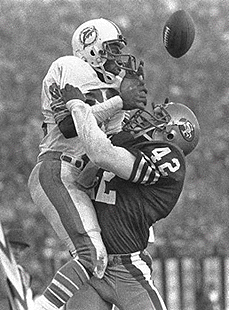Passion Play: Lott's road to HOF
If you were to choose one word to describe defensive back Ronnie Lott, it would have to be "passionate." One of the hardest hitting players ever to take the field, Lott played every down with a fearless winner-take-all attitude. A throwback to another era, he often spoke of his admiration for past bone-jarring greats like Dick Butkus, Ray Nitschke, and Sam Huff, and his desire to achieve their level of play.
A consensus All-America choice at the University of Southern California, Lott was the Trojans' 1980 Most Valuable Player. He led the Pac 10 with eight interceptions his senior season and registered 250 tackles during his four-year collegiate career.
 |
|
Ronnie Lott breaks up a pass |
As a result, the San Francisco 49ers made him their No. 1 choice - the eighth pick overall - in the 1981 National Football League draft. Lott, as advertised, was the complete package. He had speed, strength, and knowledge of the game that set him apart from most other defensive backs. And, as hoped, the 6-0, 203-pound defensive back went on to become a defensive mainstay on a 49ers' team that dominated the National Football League in the 1980s.
His 14 years of near-unparalleled play not only earned him the right to be compared to the likes of Butkus, Nitschke, and Huff, it also accorded him the privilege of joining them as a member of the Pro Football Hall of Fame.
During his remarkable career with the 49ers (1981-1990), the Los Angeles Raiders (1991-1992), and the New York Jets (1993-1994), Lott earned 10 Pro Bowl invitations at three different positions - cornerback, strong safety, and free safety. Twice he led the league in interceptions. He ranks fifth on the all-time interception list with 63 steals. He surpassed the 1,000-career tackle mark in 1993, and he had five seasons of at least 100 tackles. In 20 playoff contests (all starts), he recorded nine interceptions, 89 tackles, one forced fumble, one fumble recovery, and two touchdowns.
Born on May 8, 1959 in Albuquerque, New Mexico, Lott was raised in a military family. His father served more than 20 years with the U.S. Air Force. "My dad served our country through two wars," Ronnie said. "I was always kind of proud of him, I wanted to be like him."
Lott wasn't simply awe-struck by his father. His parents were real influences in his life. "My parents could have been disciplinarians only, but they weren't," he said. "They were much more than that." He remembers as a youth being taught the importance of seeing both sides of an issue. "Most kids are taught 'right, right, right,'" Lott recalled, "they are never taught why something is wrong. My dad was able to teach me that something is right because something else is really wrong. He would always make me understand why something was wrong."
When Lott was five years old, the Air Force reassigned his father and the family moved to Washington, D.C. Not too surprisingly Ronnie became a big Washington Redskins fan. "When you live there, you wind up being a Redskins nut, you can't help it - and that's what happened to me," he said. But football wasn't his only love. He also followed basketball, especially the Boston Celtics, baseball and hockey. From an early age, he dreamt of being a pro athlete. "I used to dream that I was Charley Taylor carrying the ball, or Sonny Jurgensen, or Frank Howard of the Senators. I was K.C. and the Big O," he said.
"When I played as a kid, there were no limitations, I never had the sense that, 'You have to do it this way and only this way,'" he recounted in a 1994 Sporting News interview. "At home I used to love practicing by myself. You know most kids never do that. I loved it. I was constantly throwing a ball up in the air and catching it; I'd imagine myself running for a touchdown or making a great play, whatever came to mind. Same thing when I was shooting baskets or even reading about great players. I'd imagine I was them."
The Lott family eventually moved to Rialto, California. Ronnie attended Eisenhower High School where he played football, baseball and basketball. He earned all-league honors in each of his three varsity seasons in football and basketball, and twice in baseball. It was primarily for football, however, that the "big-name" colleges and universities recruited him.
The Best Ever? The story of 'Joe Cool'
A Steelers' Tradition
An in-depth look at Class of 2000 enshrinee Dan Rooney who has guided the Pittsburgh Steelers to great success for more than four decades.

